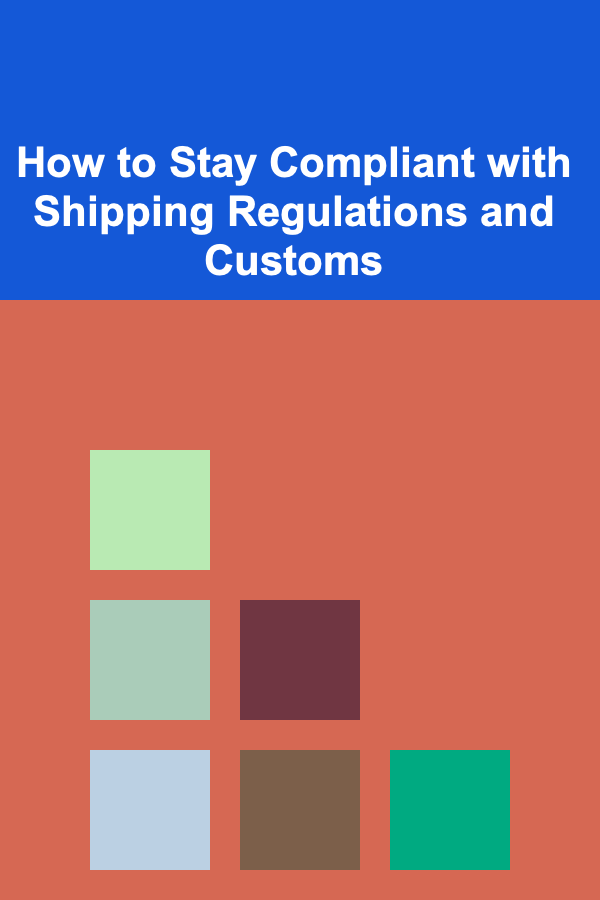
How to Stay Compliant with Shipping Regulations and Customs
ebook include PDF & Audio bundle (Micro Guide)
$12.99$9.99
Limited Time Offer! Order within the next:

In today's globalized world, businesses of all sizes are increasingly involved in international trade. Whether you're a small e-commerce business or a large corporation, shipping products across borders is essential for growth and reaching new markets. However, this process comes with its own set of challenges---one of the most significant being ensuring compliance with shipping regulations and customs laws.
Non-compliance with shipping regulations can result in costly fines, delays, and even the seizure of goods. Therefore, understanding the complexities of international shipping, including the rules and regulations that govern customs, is crucial for any business engaged in cross-border trade.
In this article, we will provide a comprehensive guide on how to stay compliant with shipping regulations and customs, outlining essential strategies, common pitfalls, and best practices that can help businesses avoid costly mistakes.
Understand the Importance of Compliance
Before diving into specific regulations and requirements, it's important to grasp the significance of compliance in international shipping. Shipping regulations and customs rules are in place to protect both the importing and exporting countries. They help ensure that products meet safety standards, protect against fraud, and prevent illegal goods from crossing borders.
Why Compliance Matters:
- Avoid Delays: Non-compliant shipments are often delayed at customs, causing disruptions to your supply chain and customer expectations.
- Prevent Fines and Penalties: Customs authorities impose heavy fines for non-compliance, which can significantly affect your bottom line.
- Protect Reputation: A failure to comply can damage your brand's reputation, especially if customers experience delays or customs issues with their orders.
- Stay Ahead of Regulations: Customs laws are constantly evolving, and keeping up-to-date with these changes is crucial to avoid legal issues.
Being proactive and informed about customs regulations and shipping laws will help you mitigate risks and ensure smooth international operations.
Know Your Goods and Their Classification
One of the first steps to staying compliant with customs regulations is understanding your products and their classification in the Harmonized System (HS) Code. The HS Code is an internationally standardized system used to classify traded products. Every item you ship falls under a specific HS Code, which determines the duties and taxes it will incur when crossing borders.
Steps to Classifying Goods:
- Research the Correct HS Code: Use official government or third-party resources to determine the accurate HS Code for your product. Incorrect classification can lead to delays or fines.
- Understand Product Restrictions: Some goods, such as chemicals, food items, or pharmaceuticals, have additional regulations or restrictions when being shipped internationally. Be sure to research these before shipping.
- Work with a Customs Broker: A professional customs broker can help ensure that your products are properly classified and that all documentation is in order.
Proper classification of your goods will not only ensure compliance but also help with calculating duties and taxes, ensuring a smoother shipping process.
Properly Prepare Shipping Documentation
When it comes to international shipping, proper documentation is essential. Incomplete or incorrect paperwork is one of the leading causes of customs delays and fines. You'll need to provide various documents to customs authorities when shipping goods across borders, and each country may have different requirements.
Essential Shipping Documents:
- Commercial Invoice: This is one of the most critical documents and contains detailed information about the shipment, including the buyer and seller, product description, quantity, and value.
- Packing List: This document provides a detailed list of all items in the shipment, including weights, dimensions, and packaging.
- Bill of Lading: The bill of lading serves as a receipt for the goods being shipped and includes details about the carrier and transportation method.
- Certificate of Origin: This document certifies the country in which the goods were produced and may be required for customs clearance, especially for duty reductions under free trade agreements.
- Import/Export Licenses: Certain products may require special permits, particularly when dealing with sensitive items like food, chemicals, or technology.
Common Documentation Errors:
- Incorrect Information: Ensure that all information is accurate, especially when it comes to product descriptions, quantities, and values.
- Missing Documents: Double-check that all necessary paperwork is included before shipping.
- Mismatched Value Declarations: Ensure that the value of the goods declared on your commercial invoice matches the value reported to customs.
Best Practices:
- Organize and Standardize: Maintain an organized system for all your shipping documentation to ensure that it is readily available when needed.
- Digital Documentation: Many customs authorities are moving to electronic filing systems, so be prepared to submit documents online.
Properly preparing and checking your shipping documentation is a fundamental step in ensuring smooth customs clearance and avoiding delays.
Comply with Import and Export Restrictions
Different countries impose varying import and export restrictions based on the nature of the goods being shipped. These restrictions are often tied to health and safety standards, national security concerns, or trade agreements. As a business, you need to be aware of these restrictions to avoid shipping prohibited or restricted items.
Types of Import/Export Restrictions:
- Prohibited Goods: Certain products are not allowed to enter or exit specific countries. These could include items like weapons, drugs, endangered species, or counterfeit goods.
- Quotas and Tariffs: Some goods may be subject to quotas, tariffs, or duties, which can affect your product's cost and profitability.
- Licensing Requirements: Certain goods, such as firearms, pharmaceuticals, or technology, may require specific licenses or certifications to be imported or exported.
- Embargoed Countries: Some countries have trade restrictions due to political reasons, meaning certain exports cannot be sent to those nations.
How to Stay Updated:
- Check Country-Specific Regulations: Regularly check the import/export regulations for the countries you're dealing with, as laws change frequently.
- Work with Freight Forwarders: Freight forwarders often have up-to-date information on restrictions and can help ensure your shipments comply with local regulations.
- Consult Government Websites: Each country's customs or trade department typically provides online resources that outline prohibited and restricted goods.
By staying aware of import and export restrictions, you can avoid sending goods that are likely to be seized or delayed, ensuring a smoother shipping process.
Know Duty and Tax Obligations
One of the most critical aspects of international shipping compliance is understanding your duty and tax obligations. Customs duties are taxes levied on imported goods, and they vary based on the product's classification, value, and origin. Ensuring that duties and taxes are properly calculated and paid will prevent delays and fines.
Understanding Duty and Tax:
- Customs Duty: This is the tax applied to goods when they cross international borders. The rate depends on the product's HS Code, its value, and the country of origin.
- Value Added Tax (VAT): Some countries impose VAT on imported goods, and it is often calculated as a percentage of the total value, including shipping and handling.
- Customs Fees: Besides duty and VAT, additional customs fees may apply, including inspection and clearance fees.
- Free Trade Agreements (FTAs): FTAs between countries may provide duty reductions or exemptions for certain goods. Ensure you're aware of any agreements that apply to your shipments.
Best Practices for Duty and Tax Compliance:
- Know the Tariff Schedule: Familiarize yourself with the customs duties for the products you're shipping to different countries.
- Accurate Valuation: Ensure the value of the goods is correctly declared, as undervaluing products to reduce duties can lead to severe penalties.
- Use a Customs Broker: A customs broker can help you navigate complex duty and tax regulations and ensure accurate payment.
By understanding your duty and tax obligations, you can budget accordingly and avoid any unpleasant surprises during the shipping process.
Monitor and Track Shipments
Once your goods are in transit, monitoring and tracking the shipment ensures that it stays on course and meets the necessary customs requirements. Modern tracking systems allow businesses to follow the progress of their shipments in real time, which can help mitigate delays or issues before they become major problems.
Why Shipment Tracking Matters:
- Real-Time Monitoring: You can check the status of your shipment at any time, ensuring that it is progressing smoothly through customs.
- Identify Issues Early: If a shipment is delayed or held up at customs, tracking systems can provide alerts so you can address the issue before it escalates.
- Better Communication: Shipping companies and customs authorities can communicate delays or issues directly through tracking systems, making it easier to resolve problems.
Tracking your shipments allows you to stay informed and maintain control over your international logistics.
Work with Experienced Partners
Building relationships with experienced international logistics partners is essential for staying compliant with shipping regulations. Freight forwarders, customs brokers, and shipping carriers with expertise in international trade can help guide you through the complexities of customs compliance.
Choosing the Right Partners:
- Customs Brokers: These professionals are licensed experts who ensure that all documentation is in order, tariffs are paid, and goods comply with regulations.
- Freight Forwarders: These professionals handle the logistics of shipping goods across borders, from warehousing to transport.
- Shipping Carriers: Choose carriers with experience in the regions where you ship, as they can help navigate the local customs procedures.
Benefits of Experienced Partners:
- Expert Guidance: Experienced partners can help you navigate complex regulations and avoid compliance issues.
- Faster Processing: With the right partners, you can ensure that your goods clear customs quickly, reducing delays and improving delivery times.
- Reduced Risk: Working with knowledgeable professionals can help reduce the risk of fines, penalties, and other compliance-related issues.
Partnering with experienced professionals will streamline your shipping process and help you maintain compliance with all regulations.
Reading More From Our Other Websites
- [Home Lighting 101] How to Use Wall Sconces to Enhance Your Home's Aesthetic
- [Personal Investment 101] How to Maintain Good Relationships with Tenants
- [Home Budget 101] How to Save on Groceries: Smart Shopping Strategies for Your Home Budget
- [Home Holiday Decoration 101] How to Create the Perfect Holiday Photo Booth: Fun Ideas for Family Gatherings
- [Tie-Dyeing Tip 101] From Blank Canvas to Gift-Ready: Step-by-Step Tie-Dye Projects for Loved Ones
- [Tie-Dyeing Tip 101] Eco-Friendly Tie-Dye: Sustainable Dyes and Practices
- [Soap Making Tip 101] Silky Smooth: Crafting Luxury Shea Butter Soap at Home
- [Home Space Saving 101] How to Declutter Your Home for More Open Space
- [Home Pet Care 101] How to Introduce Your Pet to Other Pets or Animals at Home
- [Home Storage Solution 101] How to Maximize Closet Storage for a Family of Four

How to Make a Checklist for Measuring Content Performance
Read More
How to Start Investing with Minimal Risk
Read More
How to Understand the Privacy Implications of Surveillance Cameras
Read More
How to Prevent Workout Injuries
Read More
How To Play the Accordion: Mastering the Bellows
Read More
How to Create a Printable Family Tree for Adopted Families
Read MoreOther Products

How to Make a Checklist for Measuring Content Performance
Read More
How to Start Investing with Minimal Risk
Read More
How to Understand the Privacy Implications of Surveillance Cameras
Read More
How to Prevent Workout Injuries
Read More
How To Play the Accordion: Mastering the Bellows
Read More